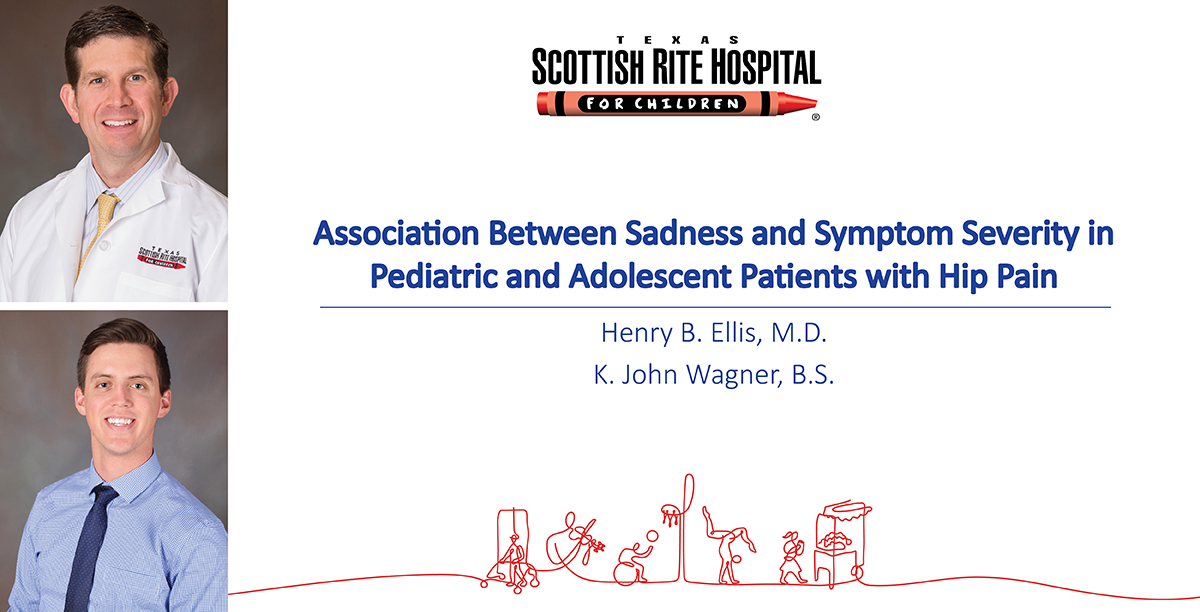
Oct 18, 2019 / Sports Medicine
Children with Femoroacetabular Impingement (FAI): How Research Advances our Practice
By design, research studies look at specific populations with a specific question in mind. The results, therefore, cannot be automatically applied to different groups of people. Here’s a look at how we take information from existing research and experience with our patients to develop a research study.
Screening for risk of poor outcomes is important for any population and treatment. Again, results of a study do not apply directly to everyone, but these results do help guide evidence-based care of pediatric patients with hip pain, particularly FAI. By screening for sadness, perhaps a symptom of underlying depression, patients at a greater risk of delayed recovery may be identified earlier.
How this helps our team
Henry B. Ellis, M.D., is a pediatric orthopedic surgeon with a special interest in managing conditions of the hip in active patients. In his extensive experience with hip arthroscopy in this population, he has noticed that mental health plays an important role in recovery. He is committed to including symptom and sadness ratings in patient care to identify patients who may benefit from psychological intervention with hip treatment.
At Scottish Rite Hospital, we care for the whole child. To do that, we have pediatric psychologists available for clinic consultation to further assess the ability of a patient to cope with and prepare for surgery and recovery. When appropriate, the psychologist can provide tools to help the patient or refer to a resource in the community.
Results of this study, “Association Between Sadness and Symptom Severity in Pediatric and Adolescent Patients with Hip Pain,” have been shared at the below meetings:
Learn more about the hospital's research.
- Current evidence: Success of treatment in adult patients with hip pain can be dependent on mental health factors.
- Clinical experience: Young patients in our practice who seem more sad have more difficulty coping and recovering after diagnosis and treatment.
- Research question: In a group of pediatric and adolescent patients with similar hip conditions, do those who report symptoms related to sadness have worse outcomes?
- Our study: Our team looked at 121 patients with femoroacetabular impingement (FAI). In this condition the bones in the hip joint are irregularly shaped which can cause pain with movement. Though clinical factors (i.e. X-rays, surgical findings) were similar in both groups, patients who reported feeling sad described worse symptoms at their first visit and one year after treatment.
Screening for risk of poor outcomes is important for any population and treatment. Again, results of a study do not apply directly to everyone, but these results do help guide evidence-based care of pediatric patients with hip pain, particularly FAI. By screening for sadness, perhaps a symptom of underlying depression, patients at a greater risk of delayed recovery may be identified earlier.
How this helps our team
Henry B. Ellis, M.D., is a pediatric orthopedic surgeon with a special interest in managing conditions of the hip in active patients. In his extensive experience with hip arthroscopy in this population, he has noticed that mental health plays an important role in recovery. He is committed to including symptom and sadness ratings in patient care to identify patients who may benefit from psychological intervention with hip treatment.
At Scottish Rite Hospital, we care for the whole child. To do that, we have pediatric psychologists available for clinic consultation to further assess the ability of a patient to cope with and prepare for surgery and recovery. When appropriate, the psychologist can provide tools to help the patient or refer to a resource in the community.
Results of this study, “Association Between Sadness and Symptom Severity in Pediatric and Adolescent Patients with Hip Pain,” have been shared at the below meetings:
- The International Annual Scientific Meeting of the International Society for Hip Arthroscopy in Madrid, Spain (October, 2019)
- The Pediatric Research in Sports Medicine (PRiSM) Annual Meeting in Glendale, Arizona (January, 2020)
Learn more about the hospital's research.



